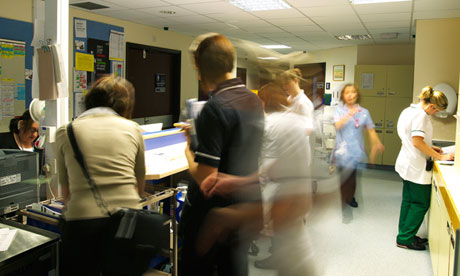Sarah Boseley Health editor
The Guardian, Thursday 13 September 2012
Royal College of Physicians says there has been 37% rise in admissions over last 10 years and new hospital planning is needed

Acute hospital care is on the brink of collapse, according to leadingdoctors who say one in 10 of their colleagues would not recommend treatment at their own hospital to a family member or friend.
A shocking picture of hospitals cracking under the strain of soaring numbers of acutely sick patients is delivered by the Royal College of Physicians, which says significant changes are needed.
The crisis has been building as more people survive cancer, heart attacks and stroke and live on into old age. Nearly two-thirds of the patients now being admitted to hospital are over the age of 65 and many are much older. Their needs are increasing – they are frail and many have dementia. Many arrive in hospital because of a sudden crisis in their health: over the last 10 years, there has been a 37% increase in emergency hospital admissions.
But at night or over the weekend, most hospitals have only a junior doctor in their first two years of training as cover. Studies show patient deaths rise by 10% over weekends. Sir Richard Thompson, president of the RCP, said: "One doctor told me his trust does not function well at night or at the weekend and he is 'relieved' that nothing catastrophic has happened when he arrives at work on Monday morning. This is no way to run a health service. Excellent care must be available to patients at all times of the day and night."
The college is calling for a complete redesign of hospital planning, to ensure consultant cover is available everywhere, 24 hours a day, seven days a week.
Doctors working in hospitals under pressure from the acutely ill told the college under cover of anonymity that the situation is dangerous. "Safety is falling to all-time lows as people get moved to wards after the most superficial of assessments and no treatment plan," said one. The absence of consultant cover at night led to "the most basic and inept clinical reviews to compound the shuttling of patients around the hospital with no thought to their welfare".
A survey of members and fellows by the college revealed that one in 10 doctors would not recommend their hospital to a family member or friend as a high-quality place to receive treatment and care and nearly a quarter were not sure. The "family and friends" test is a gauge of quality service used by some hotel chains and a measure NHS medical director Sir Bruce Keogh thinks could be useful in assessing how well the NHS is really doing.
A third of the respondents said their hospital was "average" at delivering high quality of care 24 hours a day, seven days a week and over 10% said it was "poor".
The college, together with nurses and others, has established a future hospital commission to shortly establish a blueprint for radical changes to the system.
Tim Evans, professor of intensive care medicine at the Royal Brompton in London, who is leading for the college on the commission, said the evidence from the ground was distressing. "All hospital inpatients deserve to receive safe, high-quality, sustainable care centred around their needs and delivered in an appropriate setting by respectful, compassionate, expert health professionals. Yet it is increasingly clear our hospitals are struggling to cope with the challenge of an ageing population who increasingly present to our hospitals with multiple, complex diseases. We must act now to make the drastic changes required to provide the care they deserve."
He spoke of the "fractured nature of care and the lack of compassion that may accrue as a consequence of it" as patients are moved around the hospital from one ward to another, sometimes at night, in order that new emergency admissions can be accommodated. Suzie Hughes, chair of the college's patient and carer network, said she had herself been woken at 3am while in hospital, to have routine blood tests because it was the only time a doctor was available to carry them out.
The Society for Acute Medicine recognised the issues highlighted by the RCP and supports its call for action. "Ensuring the delivery of high quality, safe and compassionate care for patients admitted to hospital in an emergency must be a key priority for clinicians, managers and politicians," said Dr Chris Roseveare, its president. "There is increasing evidence that a consultant-led, multi-professional acute medicine team provides better outcomes for patients. It is vital that acute hospitals work to provide this consistently, seven days per week.
"The NHS is being asked to deliver huge financial savings at a time when many hospitals are already buckling under pressure from the rising number of emergency admissions. A co-ordinated approach is urgently required between hospitals, general practitioners and social care agencies to address the challenges which this report has identified; without this, patients face the prospect of a very long, tough winter."
Health minister Dr Dan Poulter said: "It is completely wrong to suggest that the NHS cannot cope – the NHS only uses approximately 85% of the beds it has available, and more and more patients are being treated out of hospital, in the community or at home.
"But it is true that the NHS needs fundamental reform to cope with the challenges of the future. To truly provide dignity in care for older people, we need to see even more care out of hospitals. That's why we are modernising the NHS and putting the people who best understand patient's needs, doctors and nurses, in charge."
No comments:
Post a Comment